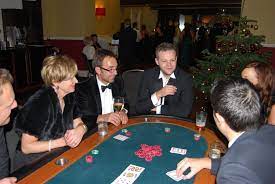We are all familiar with the idea that poker is a mind game. It entails engaging in highly sophisticated and strategic psychological operations to overcome opponents, opponents who may be better than us. However, as in most things, there are a few lightughtscared truths about poker and psychology.
To begin with, although the ultimate goal of poker is to win the money in the long run, this does not mean we should indulge in going to war with our opponents and playing every hand to defeat them. Quite a few poker players lose money by doing this, and if you don’t mind going to war with humans, you can make money in poker by using psychology and not going to war with humans.
Dividing your competitor into a human and a machine, giving him a mental battle of wits and then swiftly adapting your strategy – this might sound cartoonish, but it works. If you are waiting for aces, and your contender goes and gets you two aces, you are going to get squirmingly creamed.
Deepest wisdom comes from understanding the why and how of poker games, and the how of psychology. Poker is about people, how people think, not machines. About people’s capability of adapting and combining new situations. About people’s fear of loss, and desire to win back that safety they felt when they last lost. Poker is about the GW advantage of safety-in-faces, coupled with trying to detect and anticipate weakness. Don’t be surprised by the greed-mustache in the backround, and don’t be surprised when the unmarked stud comes up on your opponent’s button.
30% is the advantage of the hand you are holding, the other 70% is the bet size of your challenger. The higher the wager, the greater the advantage for the hand with which you are closest. The higher the wager, the greater the deterrent to an opponent staying in the hand – and the nearer hand you are to getting your desired hand.
Most stakes levels have different pot odds, which should be compared to your hand’s outs, to establish the net expected return on a call. When calling a bet, round numbers are used to explain why we bet or raise. Primarily they keep you from going broke over a Dewalive.
A precise assessment of the risk you wish to take in given scenario is required. We only want to call bets where the pot odds can support the call, in other words the odds x the number of players remaining in the hand.
The likelihood your chosen hand will be best after a showdown is about 13%. Remember, this is per hand. Odds against you on the turn is about 5%, and are about 11% on the river. The pot odds should be greater than the odds against you, the greater the risked pot will be.
When playing poker tips, it is invaluable to consider the odds against you at all times. Face it, you never know when you will be beat.
Even if you know what your hand is doing, playing odds and communicating pot odds could be more truly disastrous than not. When you call bets when you have the best of it, you are stacking the odds against you. You need to get those odds in favor if you want to get paid. The best time to call a bet is when you have already got a good piece of the flop, but you want to get paid. This is an indication of a good hand.
The flop
The best time to call a bet is when you have a reasonably good hand and all the cards necessary to win are on the table. You should call only when you have a chance of being able to win. Marginal situations are rare, but when they occur, you need to be careful.
Let’s say preflop you have AK on the big blind. It’s folded to you, and you get 2 folds. You have 7 outs: 2 already in the deck and 4 that can possibly improve. You have 5 shown cards that can win. In order to win the pot, you have to hit the flop. How likely are you to hit the flop?
